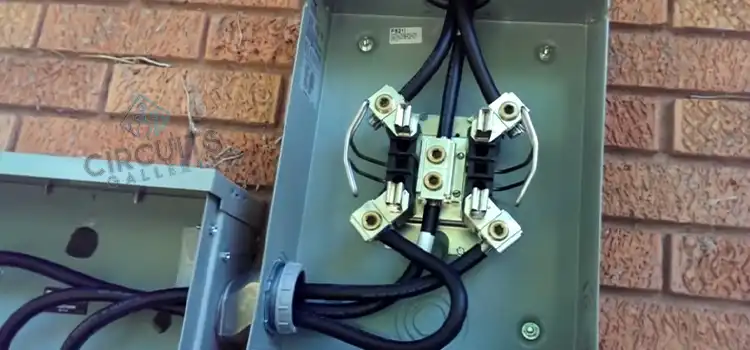Do I Need a Ground Wire From Meter to Panel? | Is a Ground Wire Essential?
Grounding of the meter is not required if it is located close to the grounded service entrance or utility transformer. However, if the distance is far enough, it is recommended to ground the meter to neutralize any potential between the earth and the enclosure that is bonded to the neutral of the system.
In most residential installations, the utility company provides the meter with two hot wires and a neutral, which it then inserts into the disconnect or panel. On the load side of the meter, we must have an outdoor service disconnect in this instance. There must be a service grounding point where the service entrance wires first contact any overcurrent safety device.

When You Should Consider Grounding Your System?
Grounding is a safety measure, but when is it advisable to implement? Consider these scenarios:
Large Distances: If your meter is a considerable distance away from the grounded service entrance or transformer, it’s prudent to ground your system for safety.
Compliance with Local Codes: Always adhere to local regulations and construction codes that may require grounding.
Safety Concerns: When safety is a concern, or you’re dealing with a high electrical load, grounding is a proactive step to protect your electrical system.
What is the Purpose of Ground Wire?
In the occurrence of a short circuit, the ground wire provides an extra route for the electrical circuit to travel into the earth, protecting anyone nearby who is working with electricity. Your body could instead complete the ground circuit in the absence of a ground wire, which could result in shock or electrocution. Grounding isn’t just a formality; it plays a critical role in electrical safety. Here’s why:
1. Protection Against Electrical Faults
Electrical faults, such as short circuits and overloads, can occur in an electrical system. A ground wire provides a safe pathway for excess current to dissipate into the earth, preventing electrical hazards and damage to the system. In the absence of a ground wire, electrical faults can lead to the risk of electric shock, fires, or equipment damage.
2. Stabilizing Voltage Levels
A ground wire helps stabilize voltage levels in the electrical system. By connecting the system to the earth, it establishes a common reference point (zero volts) and reduces the risk of voltage fluctuations. This stability is crucial for the safety and consistent operation of electrical devices and appliances.
3. Mitigating Electrical Noise
Electrical noise or interference can affect the performance of sensitive electronic equipment. A ground wire provides a path to discharge unwanted electrical noise and interference, ensuring that sensitive devices, such as computers and communication systems, function properly.
4. Meeting Safety Standards and Codes
Most electrical codes and safety standards require the presence of a ground wire in electrical systems. Compliance with these standards is essential to ensure the safety of the electrical installation and its users. Failing to include a ground wire can result in non-compliance with local regulations.
5. Protecting Against Lightning Strikes
In the event of a lightning strike or power surge, a ground wire offers a path for excess electrical energy to dissipate safely into the ground, reducing the risk of electrical fires or damage to the electrical system.
6. Human Safety
Grounding is essential for human safety. In the event of a fault or accidental contact with live electrical components, a ground wire provides a low-resistance path for current to flow into the earth, preventing serious injuries or fatalities from electric shock.
What Wire Do I Need From the Meter to the Panel?
You’ll need copper wire #4 AWG for this project. The most recommended type and size of wire is #4 size AWG copper wire, which is based on the current and voltage ratings of the meter and breaker. This choice is influenced by various factors:
Electrical Load: The wire size is determined based on the current and voltage ratings of the meter and breaker. Adequate wire size ensures efficient power distribution.
Safety Standards: Compliance with safety standards is crucial. The recommended wire size takes into account safety codes and standards to minimize electrical hazards.
Where Does the Ground Wire Go in a Meter Box?
The ground wire is attached to the neutral bus bar-bonded ground terminal located in the middle of the meter. The fitting known as a grounding lug is used to join the other end of the ground wire to a grounding rod.
Is It OK to Not Have a Ground Wire?
The ground wire is not a part of the conducting channel that delivers electricity to the device, therefore it will still function normally without it. You won’t typically be able to detect the difference if the ground wire is cut or broken.
What Happens if You Don’t Hook up the Ground Wire?
The appliance will still operate normally if you don’t hook up the ground wire because it is not a part of the conducting path. It is hard to tell the difference if the ground wire is broken.
How Do You Ground Residential Electrical Service?
The grounding conductor needs to be connected to the ground rod and placed in the acorn clamp’s “V” on the side which is not connected to the bolt. The two-piece brass-toothed clamp is attached to the ground rod using two setscrews.
Conclusion
Wire grounding is not required from meter to panel because the appliance will still work normally without it. But if you are still in safety doubt, you should do it.
Subscribe to our newsletter
& plug into
the world of circuits